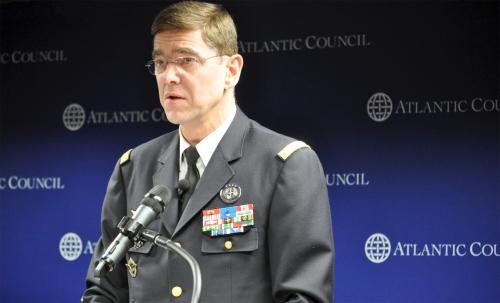
General Stéphane Abrial, Commander Allied Command Transformation (ACT), declared that, "With defense budgets under growing competition from other lines of public expenditure it is therefore imperative that we are able to assure our publics that we are wasting nothing, that we have not spared ourselves any necessary reform and ask for nothing that is not essential."
He emphasized this point repeatedly in his speech to the Atlantic Council on NATO transformation: It is "not business as usual in NATO," "we must confront the reality of severe resource constraints," and "the forces we need when and where we need them, forces that are agile, deployable, resilient as well as sustainable and, crucially, affordable."
Asked point blank by Council president and CEO Fred Kempe, "Can you really do transformation on the cheap?" and " how does ACT succeed when NATO’s cut your budget so significantly and allied nations are facing the tightest budgets in a generation?" Abrial ruefully admitted that, "You have to spend up front to be able to spare in the future. So if you don’t get the resources up front then your transformation is at risk."
At the same time, he’s a military man, not a politician. He doesn’t set defense budgets but rather explains his needs as eloquently as he can and then carries on with what he’s given. And, he cheerfully pointed out, "our budget has not been cut as much as we expected."
This environment means making smart choices with limited resources, which he sees as a primary mission of ACT. " What can you do in a budget-constrained environment? Well, the first thing is – the point I tried to develop here today is make sure that we take all the advantage we can – we leverage everything we can that the nations have and are ready to share with NATO. What do we do then? Well, we go up front, again, in all transparency to all the alliance members and we tell them we prioritize the projects we can continue to work on.
Kempe summarized: "Do less, better" and Abrial readily agreed.
"In this sense ACT also serves as a rationalizer of NATO resources, helping all nations prepare to meet future requirements without duplicating capabilities or costs unnecessarily and leading the way by leveraging existing available means and developing new ones in a more rational manner which also takes into consideration the diminishing resources. ACT is, in essence, facilitating the transformation of the alliance to a smarter and more efficient organization by making the most of innovation, building upon and improving existing capabilities and disseminating them within the nations."
In this overarching context, though, an apparently separate point stuck out: Abrial’s emphasis on the need for NATO to be able to conduct missions along the entire spectrum, including non-kinetic civil support operations — what he called "a comprehensive approach to crisis prevention and management." Indeed, he stated, "I can indeed no longer imagine any lasting solution to a security crisis through a purely military operation. And I have difficult conceiving of any truly severe crisis that could not benefit from military assistance."
What does this mean?
First, a realization that we military have a unique role to play in it, being often the first or even sometimes the only actor in theater, and whose logistics, command and control and ability to deploy people are unrivaled by any other actor. I believe this gives us a crucial responsibility to help make a comprehensive approach operational. Given our organizational and resource advantages, the military must meet other stakeholders more than halfway – both upstream of operations and on the field.
Secondly, we must acknowledge that our first contribution to a comprehensive approach is to first do our core job, to provide security, and then to be the catalyst and facilitator for others to do theirs.
Finally, this depends not only on technical arrangements and policy adjustments, but on an overall mindset that must permeate our forces and our headquarters in everything we do from training to standardization and from information operations to operational planning.
It struck me as he said that — and has therefore almost certainly occurred to a man who spends his days trying to figure out how to convince policymakers not to cut his budget as much as he’d feared — that driving home this point could be a very effective strategy for getting the forces he needs for the more traditional military parts of NATO’s mission. After all, fungibility works both ways.
The United States, after a brief demand for a "peace dividend" in the immediate aftermath of the Cold War, seems to have institutionalized massive defense spending. (Indeed, President Obama recently called for a three year freeze on discretionary spending to tackle our out-of-control deficit but specifically excluded the defense budget from the proposal.) But in most of Europe, which has been much more reluctant to engage in prolonged out-of-area operations, the idea that defense dollars are an investment in logistical and technical ability to handle civil crises may be much more salable.
James Joyner is managing editor of the Atlantic Council.
Image: stephane-abrial.jpg
